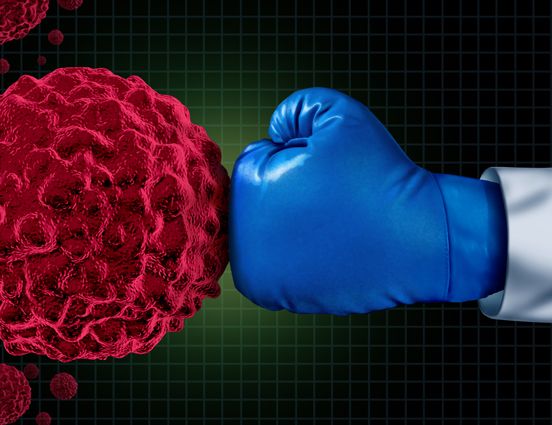The Big Questions, Answered:
Many people are wondering why some people who are infected with COVID-19 get mild to minimal symptoms, while others succumb to a life-threatening illness. This is baffling clinicians across the globe, but we can’t just throw our hands up in the air. Necessity is the mother of invention, and I am optimistic that more answers will be coming to us soon, allowing us to arm ourselves even more. There are some strong indications that people with enhanced, innate immunity and/or specific yet undetermined gut microbiomes may be more resistant to the effects of COVID-19, and I will share the scientific research on these hypotheses as they are made available.
In the meantime, a lot of my patients ask me what I’m doing to stay healthy during this period. I think it’s important to start by sharing information that is easy for all of us to adopt.
When it comes to boosting our immune system, nothing is more important than proper rest, hydration, and nutrition. But just telling people to drink more water, eat healthy, and get more sleep in the setting of a pandemic will probably fall on deaf ears. So let’s review the science behind these statements and learn how + why making healthier choices might give us all an advantage!
What is innate immunity and why is it important?
Our immunity is characterized by “innate” and “adaptive” immune responses. Humans are exposed to millions of pathogens daily through inhalation, contact, and ingestion. Epithelial cells comprise the lining found in our nose, sinus, lungs, and gut. This lining is covered in a slimy protective mucous and essentially separates the outside world from our inside world. Ideally, pathogens are cleared in this mucous layer and we remain uninfected.
When a pathogen sticks to our epithelium and penetrates this protective barrier, our immune response can be triggered in one of two ways. Our adaptive immune response comprises the SPECIALISTS that trigger antibodies to destroy a pathogen right away based on the memory of a pathogen we have seen before. On the other hand, our innate immune response comprises the FIRST RESPONDERS that deal with new infections, like the novel COVID-19 virus. Innate immunity relies on the recognition of suspicious proteins that simply look different from the host, which triggers inflammation and nonspecific immune cells like neutrophils, macrophage, and natural killer cells to attack. When a virus escapes our innate immune barriers, this stimulates a fever. Fevers help slow down viral replication because viruses don’t survive as well at higher temperatures. This helps buy time for our adaptive immune response to begin to manufacture targeted antibodies, against viruses like COVID-19.
So why is innate immunity important?
Because COVID-19 is a novel pathogen, and boosting our innate immune system is likely to be an important way to control complications of this virus.
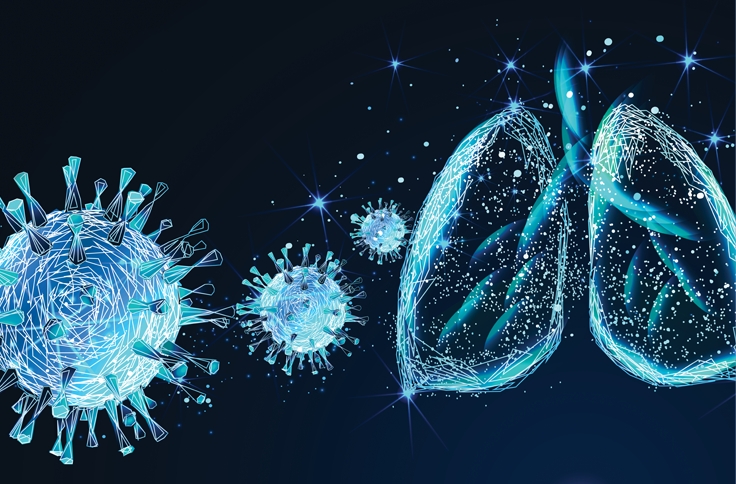
Why is sleep so important?

Sleep hygiene is very real. Stress, anxiety, and sleepless nights wreak havoc on our immune system. If you are having trouble sleeping, there is a good chance your natural melatonin biorhythm is being disrupted. Melatonin is released naturally by the pineal gland in response to darkness to signal our bodies that it’s time to sleep. Melatonin is scientifically proven to enhance both innate and cellular immunity. Turning off devices, dimming the lights, and maintaining a good sleep routine boosts natural levels of melatonin.
Did you know that it’s our innate immunity that keeps novel viruses like COVID-19 from infecting our cells in the first place?
After infection, our adaptive cellular immunity kicks in to try to make targeted antibodies.
What is innate immunity and why is it important?
Hydration has never been more important. Drinking water not only helps your body eliminate toxins but it also helps optimize cellular function and normalize mucous production. That’s important for a few reasons:
Water is a critical factor influencing many cellular physiological processes, including cellular volume and cell membrane permeability. Did you know that dehydration shrinks and weakens cells, making them more vulnerable to infection?
Mucous is actually good for us. Mucous is our bodies’ natural moisture filter and traps particles like dust, bacteria, and viruses in our nose and throat before they get to our delicate lungs. Healthy, moist noses have little tiny hairs called ‘cilia’ that sweep unwanted particles wrapped in thin mucous down our throats, where they are swallowed and destroyed by the acid in our stomachs. Sips of water throughout the day can help facilitate this process. Dehydration, on the other hand, causes mucous to get too thick and makes it harder for cilia to do their job, allowing viruses like COVID-19 to stick to cells and infect our nose, sinuses, and throat, and in more severe cases track down your windpipe to infect the lungs. Did you know that you produce about a liter of mucous a day and swallow most of it?
Did you know dehydration shrinks and weakens cells, making them more vulnerable to infection?

Why is nutrition so important?
Micronutrient deficiencies (including vitamins + minerals) are quite common in the general US population, but especially in the elderly, poor, and obese, from the consumption of nutrient-poor, processed foods. According to data from the US National Health and Nutrition Examination Survey (NHANES), 93% of the US adult population do not meet the daily requirement for vitamin E, 56% for magnesium, 44% for vitamin A, 31% for vitamin C, 14% for vitamin B6, and 12% for zinc.1 Moreover, an estimated 1 billion people in the world have either vitamin D deficiency or insufficiency.2
While the need for good nutrition to boost our immune system may be obvious, what might not be obvious is that inflammation in our gut can be causing terrible things to happen such as 1) disruption of our gut microbiomes affect our Innate immunity and 2) gut inflammation limits the mucosal surface area available to absorb those important nutrients. Did you know that deficiencies in select micronutrients (vitamins and essential minerals) can adversely affect both innate and adaptive immunity and increase vulnerability to infection and disease.
While there is probably an endless list of nutritional supplements that help boost our immune system and could be helpful to protect against COVID-19, I don’t think it’s smart to add a dozen new supplements out of fear. It’s more important to know the science behind many of these and perhaps think about deficiencies in your diets when selecting a supplement, and whether adding a probiotic to improve your gut microbiome might be right for you. In my household, I commonly rotate supplements a few weeks at a time and try to do the same with changing up meals to enrich our diet with some of the important micronutrients that we supplement less commonly. So skip the processed foods and look for ways to enrich and vary your diet naturally.
Probiotics
The importance of our gut microbiome in immunity is a hot topic of research these days. Probiotics are microorganisms, most commonly specific strains of lactobacillus and bifidobacterium, taken to replenish the “good bacteria” in our gut. Healthy gut flora has been shown to secrete protective substances that signal our innate immune system to respond in unique, yet poorly understood ways.
Probiotics are commonly recommended to restore gut flora, especially in patients who have consumed antibiotics, anytime in the last 6-12 months! Commonly used doses of 10 billion CFU are quite effective for adults and school-aged children. Although more potent formulations are available, it’s important to take the correct strains of probiotics, rather than more of them.

Did you know that our microbiome is an ecosystem of “good” bacteria living in our gut, stimulating our innate “mucosal immune system” to produce a variety of cytokines and substances with beneficial health effects?
Vitamin C
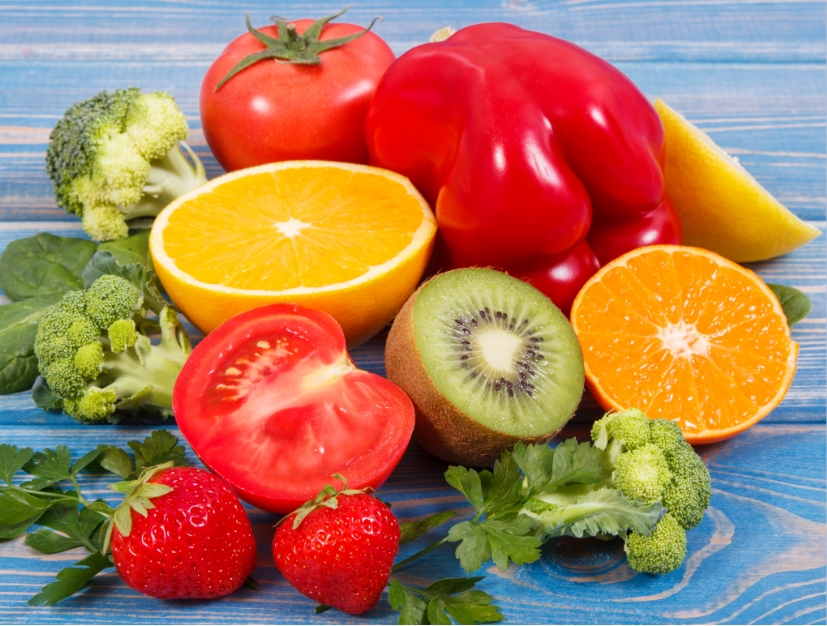
Did you know: Depending on where it is sourced, kiwi fruit can have 2-3x the Vitamin C of an orange per 100 grams, but then again kiwi’s are smaller than oranges so, in the end, it might depend on how much you eat!
Vitamin C is among the most well-known immune-boosting supplements. Vitamin C is a required cofactor, supporting various cellular functions of both the innate and adaptive immune responses, enhancing chemotaxis, phagocytosis, and microbial killing. During seasonal viral outbreaks, I typically recommend Vitamin C in doses of 2,000mg a day (1,000mg twice a day) as prevention and 4,500mg a day (1,500mg three times a day) if you feel sick or are around others who are sick.
Foods rich in Vitamin C:
- Kiwi
- Orange
- Broccoli
- Cauliflower
- Kale
- Papaya
- Tomato
- Sweet Potato
Vitamin D
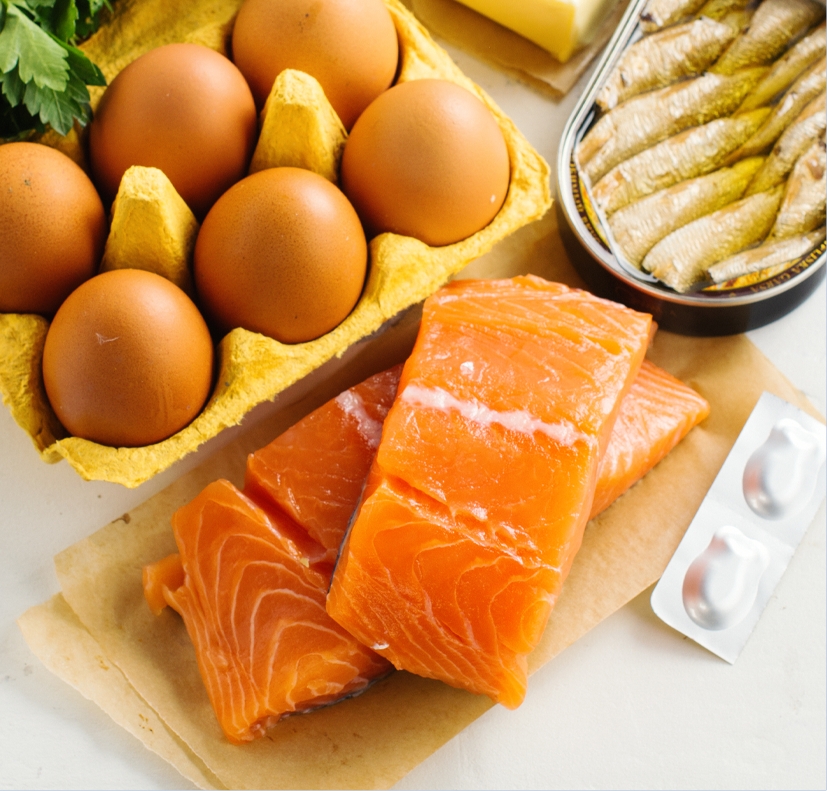
Did you know: Vitamin D is a fat-soluble vitamin, and must be ingested with fat to be absorbed by our gut. That’s why most liquid/capsule forms of Vitamin D3 supplements are made in an oil-based carrier.
Vitamin D is critical for the function of every cell in our bodies, especially our immune system. A sedentary, indoor winter lifestyle + routine use of sunblock when we do get out has left many of us deficient of the active form, Vitamin D3. Many foods are fortified by manufacturers with Vitamin D, because naturally occurring Vitamin D may not be otherwise consumed in a vegan rich diet. When our bodies are challenged, it is better for our Vitamin D levels to be on the high side of normal. This is especially true for patients who suffer from sleep apnea, who more commonly suffer from clinical Vitamin D deficiency. I advise most patients to take 5000 IU Vitamin D3 daily, and have their levels checked during routine blood work.
Foods rich in Vitamin D:
- Fatty fish (salmon, mackerel, tuna)
- Egg yolks
- Beef liver
- Cod liver
- Fortified milk and foods fortified with vitamin D on their label (some dairy products, cheese, orange juice, and cereals)
Zinc

Did you know: Zinc also functions as an antioxidant and can stabilize membranes?
Zinc is also known to play a central role in supporting various cellular functions of both the innate and adaptive immune responses, enhancing chemotaxis, phagocytosis, and microbial killing and stimulating lymphocyte activation. Zinc also functions as an antioxidant and can stabilize membranes. However, Zinc can cause nausea + sensitivity when taken in higher doses in some individuals. Try taking Zinc with food or before sleep, if you are particularly sensitive.
Foods rich in Zinc:
- Meat (beef, lamb, pork)
- Shellfish
- Legumes (chickpeas, lentils, beans)
- Seeds
- Nuts
- Dairy
- Eggs
- Whole grains
Selenium
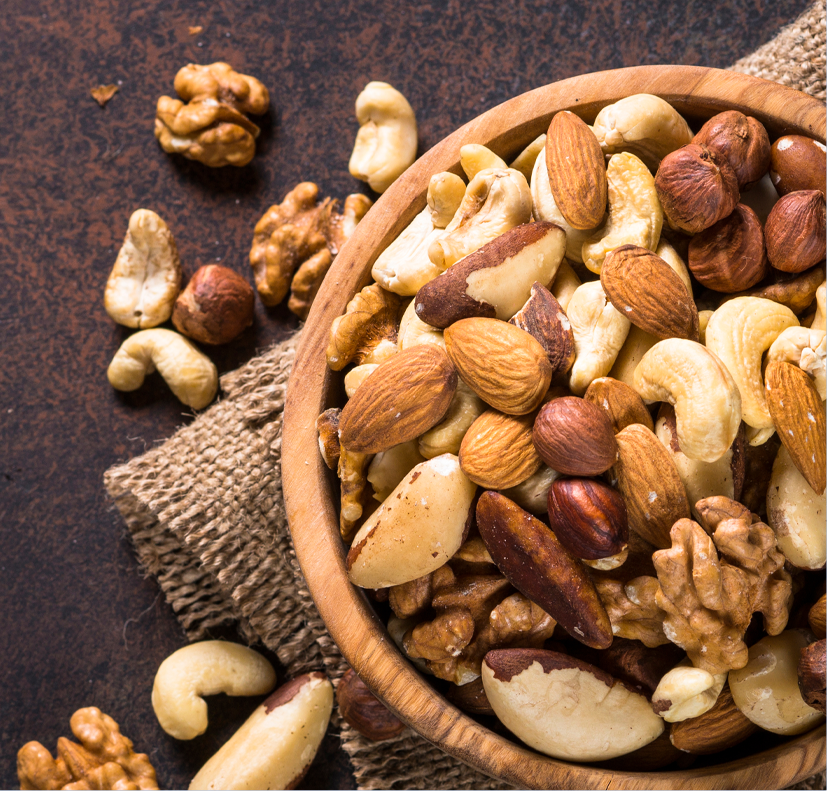
Did you know: While too little Selenium can cause
a deficiency, too much Selenium can be toxic.
Dietary Selenium is an essential micronutrient that optimizes innate and adaptive immune responses. Selenium is a known antioxidant and low levels of Selenium were associated with a reduced Natural Killer (NK) cell-mediated cytotoxicity. While too little Selenium can cause a deficiency, too much Selenium can be toxic. Selenium can be easily accessed from a balanced diet.
Foods rich in Selenium:
- Brazil nuts
- Cashews
- Walnuts
- Turkey
- Chicken
- Cottage cheese
- Lentils
- Fish (yellowfin tuna, sardines, oysters, clams, halibut, shrimp, salmon, crab)
- Oatmeal
- Spinach
- Moshfegh A, Goldman J, Cleveland L. 2005. What We Eat in America, NHANES 2001-2002: Usual nutrient intakes from food compared to dietary reference intakes. U.S. Department of Agriculture, Agricultural Research Service.
- Holick MF. Vitamin D deficiency. N Engl J Med. 2007;357(3):266-281.

